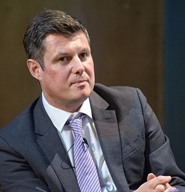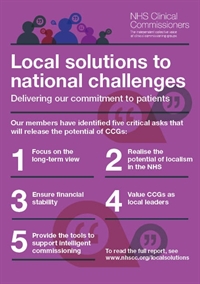23.11.15
Local solutions to national challenges: What CCGs need to deliver more for their patients
Source: NHE Nov/Dec 15
 Dr Steve Kell, co-chair of NHS Clinical Commissioners, and chair of NHS Bassetlaw CCG, discusses the practical changes that commissioners need to enable them to transform patient care and improve NHS sustainability.
Dr Steve Kell, co-chair of NHS Clinical Commissioners, and chair of NHS Bassetlaw CCG, discusses the practical changes that commissioners need to enable them to transform patient care and improve NHS sustainability.
Just over a year ago, NHS England published the Five Year Forward View, which set out both the challenges faced by the NHS and how we can meet them. This document, with its priorities of public health, sickness prevention, self-care, health inequality and care delivered into the community, was welcomed by NHS Clinical Commissioners (NHSCC) and our members – just over 86% of CCGs in England.
While no-one underestimates the huge challenge set out – to transform our health services – CCGs are more than capable of taking up this task and fulfilling the vision of the Five Year Forward View. However, the environment in which they operate needs to support this. Our members have increasingly raised concerns about an ever-growing bureaucracy with top-down priorities, a financial system that feels out of touch with long-term patient needs and a reporting process that feels oppressive and insensitive to the local context. All of this is preventing them from achieving as much for patients as they would like.
This is why in October we launched ‘Local solutions to national challenges: Delivering on our commitment to patients’. This document, developed with our members, sets out the practical changes CCGs need to continue delivering high-quality care for their patients while also making necessary efficiencies to ensure the NHS is sustainable.
 Broadly these changes can be broken down into five key themes.
Broadly these changes can be broken down into five key themes.
- Focus on the long term
CCGs must be allowed to focus on their role of transforming health services, not diverted by narrow short-term priorities imposed from the centre. Part of this involves a reduction of the burden, frequency and duplication of the short-term performance reporting they are increasingly required to carry out by national bodies. Complex issues such as sickness prevention and health inequalities take time to address and cross the divide between NHS, social care and public health. This is why we are calling for a single national outcomes framework covering all three.
- The potential of localism in the NHS
There needs to be a real recognition that diverse geographies need diverse local solutions and that a one-size-fits-all model will not work. National government may set the principles but should not dictate policy, leaving CCGs to choose the best healthcare for their local populations.
- Financial stability
This is not a knee-jerk demand for more money. CCGs have, as a group, always balanced their books and are acutely aware of the financial problems right across the public sector. But there are reforms that will put us on a more stable footing and make savings. A multi-year financial settlement, rather than the current annual allocation, for example, will enable us to invest upfront in long-term interventions making savings subsequently.
- Value CCGs as local leaders
CCGs’ understanding of their local populations is second-to-none. But their vital knowledge and expertise is being submerged under a top-down approach from NHS England, undermining them as leaders of local healthcare. There needs to be a shift towards a more mature partnership with national bodies, rather than one in which CCGs are constantly micro-managed.
- The tools to support intelligent commissioning
CCGs are also calling for a series of changes that will enable them to work smarter and faster, including better access to patient data to help them plan services; IT systems that work seamlessly with other parts of the health service and with social services; and a workforce strategy that will provide new types of staff to deliver new types of care.
What next?
The reactions to our report have generally been encouraging, with recognition across the system that these are necessary changes. For example, speaking at our annual members’ conference in early November, Lord Prior, minister for NHS productivity, indicated that the longer-term budgets we were calling for were becoming a reality. He also praised the examples of CCGs’ work highlighted in the document, saying that these were exactly in tune with the Five Year Forward View. And the Royal College of Physicians released a statement welcoming the report and its commitment to long-term planning and collaboration across the system.
I have seen some comments that point out CCGs are not the only ones in the NHS subject to onerous reporting requirements. I understand that this is felt across the system and believe this makes it more rather than less important that we highlight the burden of assurance. We understand the need for a robust assurance regime with the right challenge in the right place, but that process must not be such a burden that it hinders CCGs or their partner organisations to deliver for patients or goes against the principles of localism. We certainly intend to continue raising this issue, along with the other changes our members are asking for. These vital reforms need to take effect so that CCGs can focus on what is important – making a difference for patients.
Tell us what you think – have your say below or email [email protected]
(Top image, credit: James Boyer Smith and NHS Clinical Commissioners)